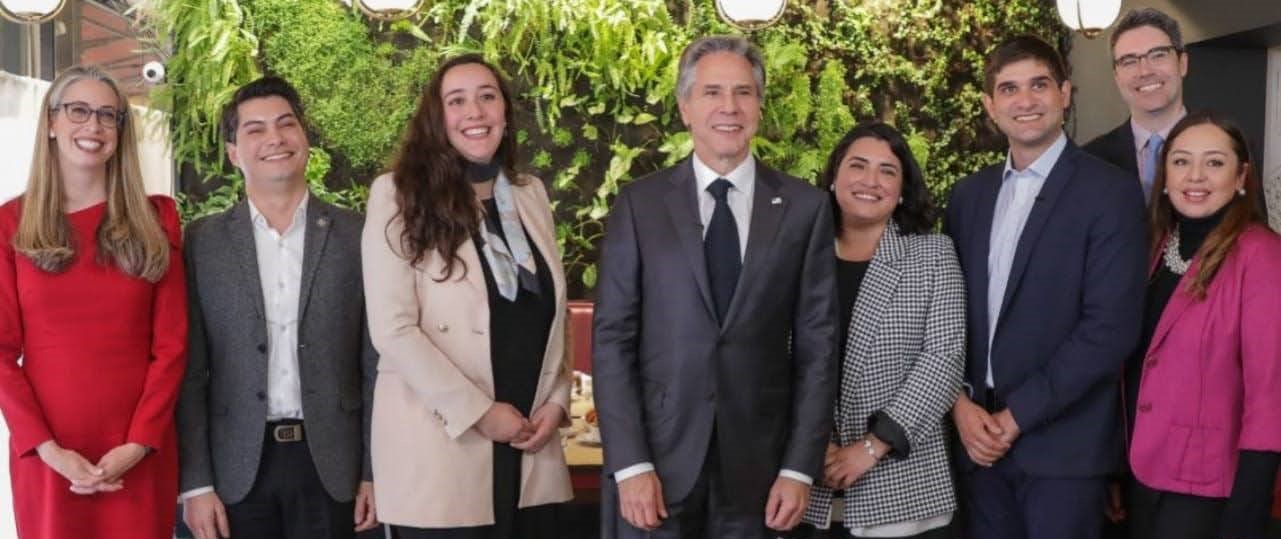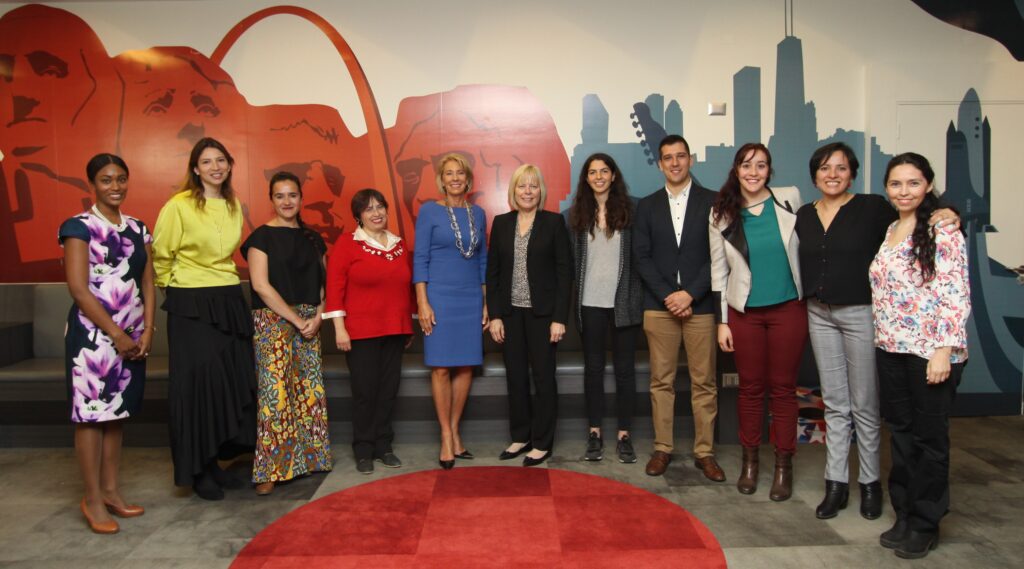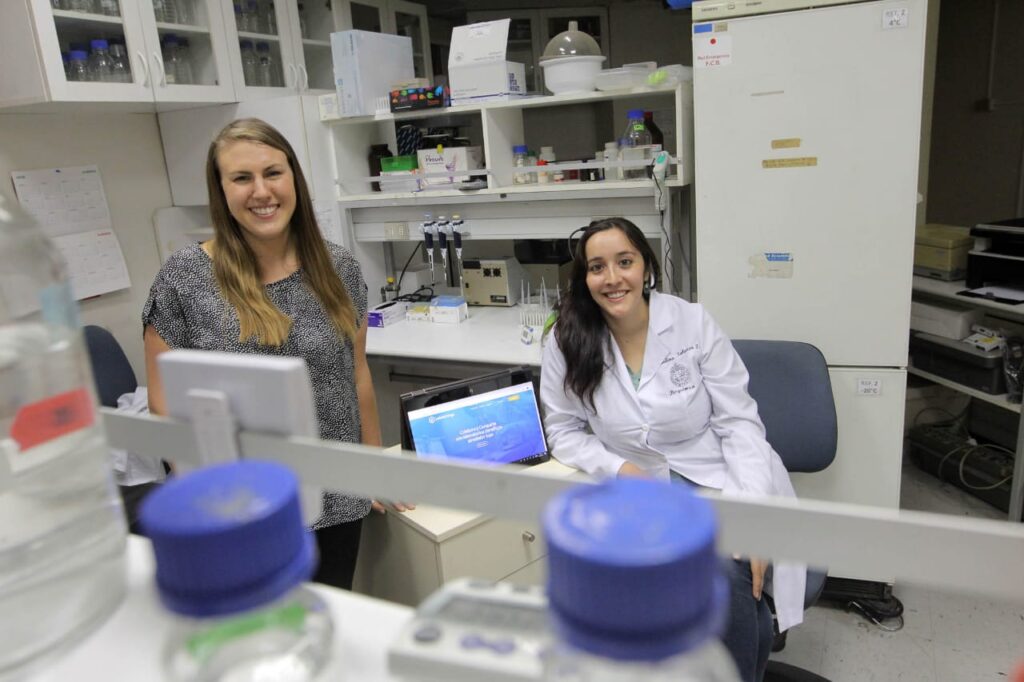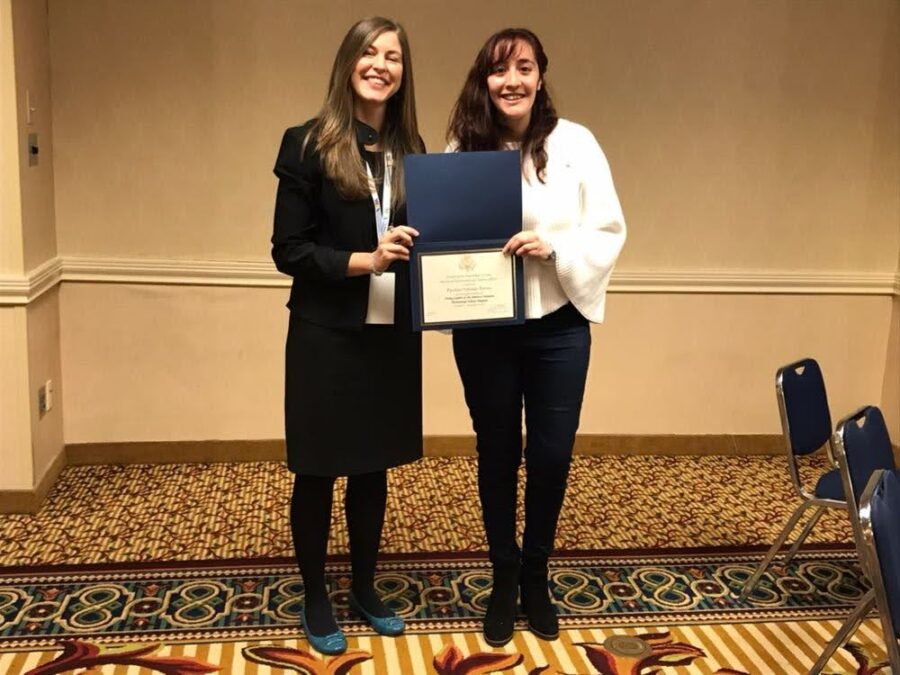Introducing Sensa Feet
Q: Could you introduce yourself and tell us about your startup?
A: I’m Paulina Salazar, the co-founder of Sensa Feet, a startup focused on monitoring and preventing amputation in diabetic patients. My journey into entrepreneurship began right after my biochemistry studies. Sensa Feet is not my first venture; I started with LabNettings, a scientific network aimed at maximizing resource utilization within laboratories. This experience led me to realize the importance of a solid foundation in business management, prompting me to pursue a master’s in management administration.
The journey has been enriching, filled with learning and networking opportunities, notably through my participation in startup accelerator programs like Start-Up Chile, Startup Science, and Open Seniors. These programs not only provided wisdom but also exposed me to a community of entrepreneurs and resources vital for growth.
Additionally, my involvement in the Young Leaders of America’s Initiative, funded by the U.S. State Department, was a pivotal moment. It offered me a chance to immerse myself in Boston’s vibrant scientific entrepreneurship scene, interact with CEOs of similar companies, and connect with over 250 entrepreneurs from Latin America and the Caribbean.
This experience significantly influenced my entrepreneurial path, enriching my perspective and fueling my passion for making a difference in the healthcare sector, especially for diabetic patients at risk of amputation.
Why Start-Up Chile?
Q: What inspired you to join Start-Up Chile?
A: My journey into the entrepreneurial world was significantly influenced by my academic background in biochemistry and my early exposure to entrepreneurship during university. I had the opportunity to take a design course that introduced me to design thinking and the entrepreneurship method, which involved exploring and testing ideas in a low-budget context. This experience was a turning point for me, igniting my passion for entrepreneurship.
Additionally, my parents have been a substantial source of inspiration. Both entrepreneurs founded a health company in La Serena, a Chilean city, demonstrating remarkable resilience and risk-taking abilities to grow their business. Witnessing their dedication and success inspired in me the desire to pursue my own entrepreneurial path.
Upon completing college, I seized the opportunity to apply to Start-Up Chile with an initial idea that eventually evolved into LabNettings. The program, which focused on empowering women entrepreneurs, offered me a unique platform to launch my venture. This coincided with a job offer in a laboratory focused on Alzheimer’s disease research, presenting me with a critical decision point.
Choosing entrepreneurship over a conventional job path was a decision I’ve never regretted. The blend of personal inspiration, educational experiences, and the supportive environment of Start-Up Chile propelled me into the entrepreneurial journey I’m on today, combining my passion for science and innovation to make a meaningful impact.
Start-Up Chile Application Process
Q: Can you share your experience with the Start-Up Chile application process?
A: Reflecting on our application to Start-Up Chile, I realize how our approach was less serious than how I would handle it today. Initially, we were quite young and perhaps naïve, focusing simply on filling out the application form with our idea. A pivotal moment in our application journey was meeting someone already in the program who offered to review our application. His advice was invaluable; he encouraged us to infuse our application with passion, highlighting the significance of the problem we were addressing and the potential impact of our solution. This perspective shift, from a dry, scientific approach to a more engaging and passionate narrative, was crucial.
Another component of our application was creating our first pitch video, which was a time-consuming but enlightening experience. It was our initial attempt at succinctly conveying our vision and mission, marking a significant step in our application.
After submitting our application, we received a preliminary acceptance, which wasn’t a final approval but rather an invitation to the next phase. This involved an interview with Start-Up Chile’s team to ensure that we were fully committed to our venture, with no other jobs or distractions. This stage was critical to demonstrate our dedication and readiness to invest our time entirely in the startup. The entire process, from revising our application to the interview, emphasized the importance of passion, clarity, and full commitment to our entrepreneurial journey.
Inside Start-Up Chile Program
Q: Could you describe how Start-Up Chile is structured and what the program entails?
A: My experience with Start-Up Chile was unprecedented and profoundly impactful, setting it apart from anything I had previously encountered. The program was meticulously crafted to promote collaboration, learning, and growth among all participating startups. It included several key components that facilitated our development.
At the heart of the program were Platoon Meetings, where teams had the opportunity to share their progress, receive feedback, and offer support to one another. This created a highly collaborative environment conducive to mutual development. Additionally, One-on-One Meetings ensured personalized guidance, enabling us to closely monitor our progress and address any issues promptly. The program also featured Weekly Lectures or Talks on vital topics such as legal matters, marketing, and team structuring, providing us with the necessary knowledge to start and manage our businesses effectively. These sessions were not only educational but also offered access to services crucial for navigating specific challenges like legal and tax issues.
A significant emphasis was placed on planning and fiscal management, requiring us to adhere to a Gantt Chart and meticulously manage our finances and expenses—a challenging yet invaluable lesson in organization and fiscal responsibility, especially given Chile’s stringent record-keeping requirements. An essential aspect of Start-Up Chile was the focus on validating our business model on a minimal budget, enabling us to pivot our strategy early on without incurring significant financial risk. This involved engaging directly with potential users to refine our offerings based on their feedback on our platform’s mock-ups.
Furthermore, the program included pitch training sessions and culminated in Demo Day, where we had the chance to present our projects to investors, competing for recognition and additional funding. Upon entering the program, we received an initial grant of $10,000, with Demo Day offering further funding opportunities. While we were in the early development stages and not ready for significant investment, other more established entrepreneurs successfully secured additional funding during this phase. This comprehensive approach to startup development underscored the unique and enriching experience that Start-Up Chile provided.
Achieving Milestones and Overcoming Challenges
Q: What was the most significant milestone you achieved during the Start-Up Chile program?
A: For me, the most impactful milestone was definitely the process of going door-to-door to interact with potential users and validate our product. This hands-on approach of testing our solution in real-world scenarios provided invaluable insights. Being able to witness firsthand the reactions of users to our prototype not only affirmed the relevance and potential impact of our solution but also highlighted areas for improvement. These encounters were crucial; they offered direct feedback that helped refine our offering, ensuring it stood out and delivered genuine value compared to competitors. This validation phase was fundamental in shaping our project’s direction, emphasizing the importance of user feedback in developing a product that truly addresses the needs of our target audience.
Q: During the Start-Up Chile program, did you encounter any challenges, or is there anything you would change?
A: The international aspect of the program in 2017 presented both a significant challenge and a unique opportunity. Engaging with women from diverse countries was an enriching experience, but the language barrier posed a notable challenge. Since the program was conducted entirely in English to accommodate the international cohort, navigating the nuances of English communication among participants from various cultural backgrounds was initially daunting.
This challenge, however, turned into a valuable learning experience, enhancing our English proficiency and boosting our confidence in international settings. Another critical lesson was the importance of being meticulously organized with expenses. The program’s demand for detailed financial tracking was a rigorous but essential part of the entrepreneurial journey, teaching us the significance of financial discipline and organization. These experiences, although challenging, contributed significantly to our personal and professional growth within the program.
Current Status and Future Goals for Sensa Feet
Q: Can you update us on the current status of your company and any future goals you have?
A: LabNettings, my initial venture, is still operational. We’re exploring opportunities to sell the technology, recognizing that our early market entry may have been premature. The concept of maximizing the use of resources, especially those funded by government initiatives, has gained traction recently. Many organizations now see the value in utilizing idle equipment, aligning with our original vision for LabNettings. This shift in awareness has led to increased interest in our technology, marking a potential pivot point for the project.
Simultaneously, my focus has shifted towards Sensa Feet, a venture aimed at preventing diabetic foot ulcers through innovative technology. We’ve developed a prototype insole that integrates 3D printing and circuitry to monitor pressure and temperature conditions in real time. This data, indicative of potential ulcer formation, is communicated to patients and caregivers via a dedicated app and to healthcare professionals through a specialized platform. This approach not only facilitates early intervention but also enables more precise monitoring of a patient’s condition. Our immediate goal is to refine and validate Sensa Feet’s technology, ensuring it effectively aids in the early detection of conditions leading to ulcers.
The journey from LabNettings to Sensa Feet encapsulates a learning curve in understanding market timing and the importance of technology in healthcare innovations. As we continue to develop Sensa Feet, our vision is to bridge the gap between technology and healthcare, providing proactive solutions to improve patient outcomes.
Q: What are your plans for Sensa Feet this year?
A: This year, our primary focus for Sensa Feet is to initiate our first pilot program with a diabetic group. We’re actively forming partnerships with government healthcare institutions to facilitate this testing phase. Our aim is to rigorously test the product in real-world scenarios, which is crucial for refining and optimizing our technology based on feedback and performance.
While product development remains a significant aspect of our agenda, our strategy also includes expanding our reach and laying the groundwork for commercialization. By the end of the year, we anticipate beginning the sale of our first units. This dual approach of testing and preparing for market entry underscores our commitment to ensuring Sensa Feet not only meets but exceeds the needs of patients and healthcare providers.
Final Advice for Prospective Start-Up Chile Applicants
Q: Do you have any advice for founders considering applying to Start-Up Chile?
A: My advice to potential applicants is to ensure you’re deeply passionate about your venture and prepared to commit fully to the journey. The path of entrepreneurship, particularly within an accelerator like Start-Up Chile, demands a lot of time, energy, and dedication. It’s not without its challenges; you’ll encounter both highs and lows along the way. The key is to remain resilient, adaptable, and open to learning from these experiences.
Another crucial piece of advice is to embrace the community around you. The spirit of mutual support and collaboration is strong among participants in Start-Up Chile. Don’t hesitate to seek help or offer your assistance to others. My own experience was significantly enhanced by the guidance and feedback from peers and mentors within the program. This collaborative environment not only aids in overcoming obstacles but also enriches your entrepreneurial journey. Remember, there are always people willing to help; reaching out can make a substantial difference in your progress and success.




